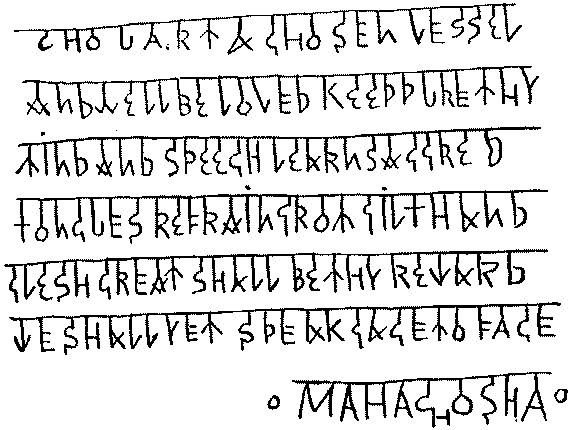
BOGUS MAHATMA MESSAGES
ON November 30th, 1894, I received, from a source I always respect, this warning: "Look out for anonymous and bogus "occult" messages to members of the Society. Both will be sent, as attempts at delusion, as burlesques, and for other purposes." On the second of December, at 144 Madison Avenue, New York, a New York F.T.S. in the presence of Mr. A. Fullerton handed me a packet. A plate giving the written contents is given below.
The member's name is Joseph W. Ganson, a very earnest student. He said it had fallen into his lap at his Club, the Harvard, or seemed to fall out of a newspaper he held. The only other person present was a friend who declared he had nothing to do with it. The packet is of yellowish linen paper, looking quite eastern. It was addressed "Ganson," and near the address is "a pledge." Inside was also a half of a palm-leaf south Indian manuscript with a flower in it.
Mr. Ganson said he did not know whether it was genuine or not, but could not decide and asked me to tell him. I then said that if a joke he could take the words to heart, if he chose, for what was good in them, but that in three days I would decide. On December 5th I gave him a signed certificate that the message is not genuine and had been concocted by three persons, and that all genuine objective messages from the Masters carried with them a peculiar and definite odor which could not be imitated and which once identified would not be forgotten. The message was shown to a large number of members at a meeting, and but few were willing to decide for or against it, admitting non-ability save by argument, inference, and appearance. Appearance is no guide, because this message might have been genuine and still have the same appearance and contents.

Mr. W. E. Coleman of San Francisco is also occupying himself in sending post-cards to many members in all parts signed "Mahatma E." with three stars, referring to exposures and scurrilous attacks. Members may as well know these facts. I invite all to send to me any and all messages, real or pretended, and I will guarantee to render a decision according to the fact in each case. Beware not only of bogus messages but also of anonymous communications.
WILLIAM Q. JUDGE
Path, January, 1895
|

